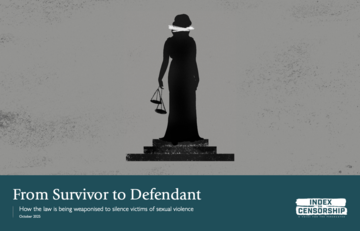
Since the rise of the #MeToo movement in 2017, countless women worldwide have shared their experiences of sexual and gender-based violence (SGBV). Yet, for many survivors, speaking out has brought new trauma in the form of legal retaliation. Increasingly, survivors and journalists who expose abuse are being targeted with SLAPPs—strategic lawsuits against public participation—designed to intimidate and silence them rather than seek justice.
Originally identified in the US in the 1980s, SLAPPs have become a growing concern across Europe. Their aim is not to win in court but to drain their targets emotionally and financially, exploiting the fear of costly, drawn-out litigation. For survivors of SGBV, these cases are especially devastating, forcing them to relive trauma and remain entangled with their abusers through the legal system. As lawyer Tamsin Allen notes, the process itself can become a form of coercive control—an extension of the original abuse.
This legal manipulation thrives on power imbalances—financial, social, and gendered. Survivors often face stigma, disbelief, and a lack of institutional support, while abusers exploit a system already stacked against victims. Low conviction rates for sexual offences deepen this imbalance, as survivors without a criminal verdict to “prove” their experience are left vulnerable to defamation claims.
Because many SLAPP threats are confidential and never reach trial, the true scale of the problem remains hidden. Yet a clear pattern emerges: survivors are isolated, silenced, and retraumatised by a legal system that enables abusers to reassert control. Rather than offering redress, the law itself becomes a tool of continued harm—one that suppresses both survivors’ voices and the public’s right to know.
To restore justice and protect free expression, urgent reform is needed.
Report’s key recommendations
- Adopt robust anti-SLAPP laws across the UK and Ireland, ensuring early dismissal of abusive cases, cost protections for defendants, and sanctions against misuse.
- Fully implement the EU Anti-SLAPP Directive in Ireland and align all jurisdictions with Council of Europe standards.
- Ensure access to civil legal aid for survivors defending against SLAPPs.
- Train judges and legal professionals—in line with the Istanbul Convention—on how the law can be misused to silence SGBV survivors.
- Issue clear regulatory guidance condemning intimidatory legal tactics and enforcing sanctions for unethical conduct.
- Raise parliamentary and public awareness of SLAPPs’ chilling effect on survivors’ freedom of expression.
The law should protect survivors, not punish them. Until it does, justice and free expression will remain out of reach.
Tags: SLAPP SLAPPS Legal harassment Freedom of expressionThe content of this article can be used according to the terms of Creative Commons: Attribution-NonCommercial 4.0 International (CC BY-NC 4.0) . To do so use the the wording "this article was originally published on the Resource Centre on Media Freedom in Europe" including a direct active link to the original article page.

